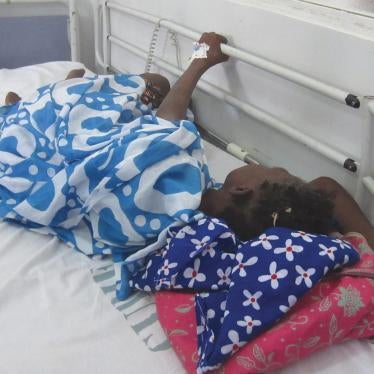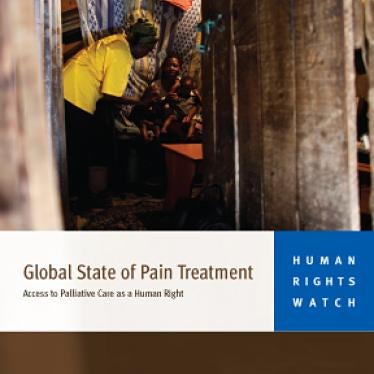The South African government has undermined its promising initiative to provide anti-AIDS drugs to prevent HIV among rape survivors, putting lives at risk amid a dual epidemic of sexual violence and HIV/AIDS, Human Rights Watch said in a report issued today.
The 73-page report, “Deadly Delay: South Africa’s Efforts to Prevent HIV in Survivors of Sexual Violence ,” documents how government inaction and misinformation from high-level officials have undermined the effectiveness of South Africa’s program to provide rape survivors with post-exposure prophylaxis (PEP) — antiretroviral drugs that can reduce the risk of contracting HIV from an HIV-positive attacker.
“The South African government has taken a crucial step in recognizing the importance of HIV prevention for rape survivors,” said Rebecca Schleifer, researcher with Human Rights Watch’s HIV/AIDS and Human Rights Program. “But there is a deadly disconnect between the government’s stated intention to provide drugs that can prevent HIV and the reality for rape survivors who can’t get them.”
In the face of South Africa’s explosive AIDS epidemic, rape and other rampant forms of sexual violence can be a death sentence for women and girls. In April 2002, the government pledged to provide PEP as part of a comprehensive package of services for rape survivors. Obtaining PEP quickly can reduce the risk of contracting HIV after rape.
However, the government launched its PEP program in near silence. Government failure to provide adequate information or training on PEP has left both service providers and rape survivors in the dark. Given the state’s history of opposition to antiretroviral drugs, the lack of clear messages from high-level officials supporting PEP has further undermined rape survivors’ ability to get the drugs.
“Police and nurses who should have been helping rape survivors get anti-HIV drugs didn't do so, sometimes because they had no idea that the program even existed,” Schleifer said. “And some service providers may not have offered these drugs even when they knew about them, because they thought that doing so was against government policy.”
After years of government opposition to providing anti-AIDS drugs in the public health system, including statements by President Thabo Mbeki questioning whether these drugs were too toxic to use, the government announced in August 2003 a nationwide treatment program for people with AIDS.
“South Africa’s broader plan to provide antiretroviral treatment will encounter many of the same challenges as providing anti-HIV drugs to rape survivors: effective public education, clear political support, and guaranteed access for children,” Schleifer said. “The government’s inability to implement a small-scale program like PEP raises concerns about its plan to provide antiretroviral treatment on a grand scale.”
Police often respond inadequately to rape complaints, neglecting to help rape survivors get medical treatment, or in some cases, even turning them away. Coupled with health professionals’ insistence that rape survivors file a police report to get medical services, which is a requirement at odds with Department of Health policy, these factors have further impeded access to PEP. One counselor told Human Rights Watch, “almost all the time police refuse to open a case” for rape survivors. In turn, doctors have refused to examine rape survivors who had not reported their cases to police.
Children, an estimated 40 percent of rape and attempted rape survivors in South Africa, are especially harmed by the government’s failure to take their needs into account. By law, children under 14 cannot consent on their own to PEP services or the prerequisite HIV testing. This poses problems for children seeking services unaccompanied by a parent or legal guardian — a common problem, particularly for children in communities hard hit by HIV/AIDS. Moreover, national PEP guidelines do not include information on how to give PEP to children under 14, leaving many health professionals without basic guidance for younger children.
Few African countries provide PEP for rape survivors, although this is a standard service in many other countries. South Africa's PEP program could become a model as other states in the region begin to develop PEP services and broader antiretroviral treatment programs.
Human Rights Watch calls on South Africa to take urgent action to:
- Launch a comprehensive public education campaign on PEP services for survivors of rape and other forms of sexual violence, and make clear statements supporting antiretroviral drugs;
- Issue a clear policy directive that filing a police report is not a prerequisite to obtaining PEP or other medical services following rape or other forms of sexual violence;
- Ensure adequate training on PEP and sexual violence for police, health professionals and other service providers who work with sexual violence survivors;
- Adopt procedures to facilitate prompt consent to PEP services and HIV testing for children under 14; and
- Restore and enact provisions in the Criminal Procedure (Sexual Offences) Amendment Bill requiring the state to provide PEP as well as other appropriate medical treatment and counseling to sexual violence survivors.





